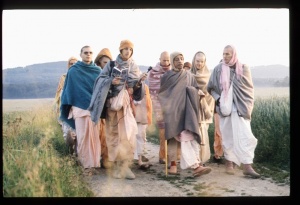CC Madhya 9.29: Difference between revisions
m (1 revision(s)) |
No edit summary |
||
| Line 1: | Line 1: | ||
{{ | [[Category:Sri Caitanya-caritamrta - Madhya-lila Chapter 09|C029]] | ||
<div style="float:left">'''[[Sri Caitanya-caritamrta|Śrī Caitanya-caritāmṛta]] - [[CC Madhya|Madhya-līlā]] - [[CC Madhya 9|Chapter 9: Lord Śrī Caitanya Mahāprabhu's Travels to the Holy Places]]'''</div> | |||
<div style="float:right">[[File:Go-previous.png|link=CC Madhya 9.28|Madhya-līlā 9.28]] '''[[CC Madhya 9.28|Madhya-līlā 9.28]] - [[CC Madhya 9.30|Madhya-līlā 9.30]]''' [[File:Go-next.png|link=CC Madhya 9.30|Madhya-līlā 9.30]]</div> | |||
{{CompareVersions|CC|Madhya 9.29|CC 1975|CC 1996}} | |||
{{RandomImage}} | |||
==== TEXT 29 ==== | ==== TEXT 29 ==== | ||
<div | <div class="verse"> | ||
ramante yogino ’nante | :ramante yogino ’nante | ||
satyānande cid-ātmani | :satyānande cid-ātmani | ||
iti rāma-padenāsau | :iti rāma-padenāsau | ||
paraṁ brahmābhidhīyate | :paraṁ brahmābhidhīyate | ||
</div> | </div> | ||
| Line 14: | Line 18: | ||
==== SYNONYMS ==== | ==== SYNONYMS ==== | ||
<div | <div class="synonyms"> | ||
''ramante''—take pleasure; ''yoginaḥ''—transcendentalists; ''anante''—in the unlimited; ''satya-ānande''—real pleasure; ''cit-ātmani''—in spiritual existence; ''iti''—thus; ''rāma''—Rāma; ''padena''—by the word; ''asau''—He; ''param''—supreme; ''brahma''—truth; ''abhidhīyate''—is called. | |||
</div> | </div> | ||
| Line 21: | Line 25: | ||
==== TRANSLATION ==== | ==== TRANSLATION ==== | ||
<div | <div class="translation"> | ||
“‘The Supreme Absolute Truth is called Rāma because the transcendentalists take pleasure in the unlimited true pleasure of spiritual existence.’ | “‘The Supreme Absolute Truth is called Rāma because the transcendentalists take pleasure in the unlimited true pleasure of spiritual existence.’ | ||
</div> | </div> | ||
| Line 28: | Line 32: | ||
==== PURPORT ==== | ==== PURPORT ==== | ||
<div | <div class="purport"> | ||
This is the eighth verse of the Śata-nāma-stotra of Lord Rāmacandra, which is found in the Padma Purāṇa. | This is the eighth verse of the ''Śata-nāma-stotra'' of Lord Rāmacandra, which is found in the ''Padma Purāṇa''. | ||
</div> | </div> | ||
__NOTOC__ | |||
<div style="float:right; clear:both;">[[File:Go-previous.png|link=CC Madhya 9.28|Madhya-līlā 9.28]] '''[[CC Madhya 9.28|Madhya-līlā 9.28]] - [[CC Madhya 9.30|Madhya-līlā 9.30]]''' [[File:Go-next.png|link=CC Madhya 9.30|Madhya-līlā 9.30]]</div> | |||
__NOTOC__ | |||
__NOEDITSECTION__ | |||
Revision as of 13:02, 22 August 2021
Śrī Caitanya-caritāmṛta - Madhya-līlā - Chapter 9: Lord Śrī Caitanya Mahāprabhu's Travels to the Holy Places

His Divine Grace
A.C. Bhaktivedanta Swami Prabhupada
A.C. Bhaktivedanta Swami Prabhupada
TEXT 29
- ramante yogino ’nante
- satyānande cid-ātmani
- iti rāma-padenāsau
- paraṁ brahmābhidhīyate
SYNONYMS
ramante—take pleasure; yoginaḥ—transcendentalists; anante—in the unlimited; satya-ānande—real pleasure; cit-ātmani—in spiritual existence; iti—thus; rāma—Rāma; padena—by the word; asau—He; param—supreme; brahma—truth; abhidhīyate—is called.
TRANSLATION
“‘The Supreme Absolute Truth is called Rāma because the transcendentalists take pleasure in the unlimited true pleasure of spiritual existence.’
PURPORT
This is the eighth verse of the Śata-nāma-stotra of Lord Rāmacandra, which is found in the Padma Purāṇa.